ELFA Reacts to New Jersey Small Business Loan Bill
October 31, 2018 The Equipment Leasing Financing Association (ELFA) had its 57th Annual Convention in Phoenix in the middle of October. During the convention, ELFA’s Vice President of State Government Relations Scott Riehl left abruptly to get to Trenton, New Jersey. Why the rush? He had been alerted that there was a hearing on a small business lending bill that could have significant ramifications for his members.
The Equipment Leasing Financing Association (ELFA) had its 57th Annual Convention in Phoenix in the middle of October. During the convention, ELFA’s Vice President of State Government Relations Scott Riehl left abruptly to get to Trenton, New Jersey. Why the rush? He had been alerted that there was a hearing on a small business lending bill that could have significant ramifications for his members.
“My whole goal was to find the sponsor, introduce ourselves to the sponsor and educate the sponsor as to equipment leasing in New Jersey, how long it’s been going on, and how important it is to the economy of New Jersey,” Riehl said.
The bill’s sponsor is Senator Troy Singleton who represents New Jersey’s 7th legislative district.
Speaking to the urgency of such matters, Riehl said, “You’ve got to get on the ground immediately. And that’s what we did.”
Riehl’s last minute trip across the country proved to be a fruitful one. He was able to meet Singleton that day in the hallway of the building where the hearing was being held.
While several industries have descended on Trenton to educate policymakers on the advantages and pitfalls of the proposed language, equipment leasing companies managed to carve themselves out of the bill entirely.
Reihl said that being able to point to the equipment leasing exemption in a similar California bill (SB 1235) was helpful. He and ELFA were also involved early on in making their argument against elements in the original California bill.
Having a history communicating with policymakers is also critical, Riehl said.
“The ELFA, for the better part of 25 years, has had a very vibrant state government relations division,” Riehl said. “And that makes a difference.”
Cerebro Capital’s Trick? Automating Compliance in a Loan Marketplace
October 29, 2018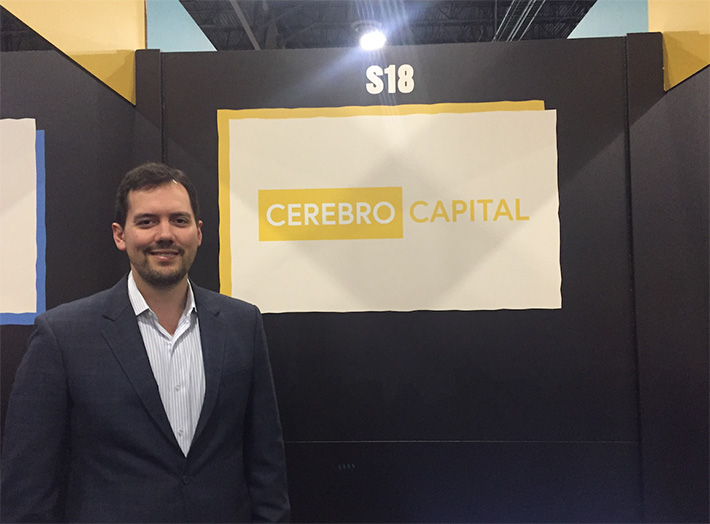 Cerebro Capital CEO Matthew Bjonerud spoke to deBanked last week at Money 2020 in Las Vegas. He was standing at his booth in the “Startup” section of the conference’s Expo Hall.
Cerebro Capital CEO Matthew Bjonerud spoke to deBanked last week at Money 2020 in Las Vegas. He was standing at his booth in the “Startup” section of the conference’s Expo Hall.
Bjonerud and his team have created a marketplace for middle market loans, from $1 million to $100 million. And Bjonerud said that borrowers can anonymously search for lenders to determine which ones are the right fit for them.
“We can show borrowers the lenders that can do the deals they want without telling the lenders that the borrowers are even looking, Bjonerud said. “It’s a great benefit [for borrowers] to using our platform.”
In addition to being a marketplace for middle market loans, the Baltimore, Maryland-based startup also simplifies the compliance process for lenders.
“Once loans are closed…we will automate the compliance,” Bjonerud said. “We’re the only ones who allow that to happen in the marketplace – where we will actually create the compliance certificates for the lenders based on automatically [using] financial statements and other elements.”
This compliance service is billed to the lender as a subscription fee. Otherwise, when a loan deal is closed via Cerebro Capital’s marketplace, it is the borrower, not the lender, that pays Cerebro Capital.
“We’re providing the borrower with better terms than they would otherwise get in the market,” Bjonerud said.
Prime and Non-prime Lenders Exchange Notes
October 25, 2018 Ken Rees, CEO, Elevate
Ken Rees, CEO, ElevateAt Money 20/20 Ken Rees, CEO of Elevate, a non-prime consumer lender, sat down with David Kimball, CEO of Prosper, a prime consumer lender. As they discussed a number of topics, listeners got insight into how these lenders think, and how they think differently based on the customers they serve.
On Partnering with Banks
Rees said that he is eager to partner with banks and that banks have spoken to him about a gap they have – namely, the fact that they have thousands, if not millions, of checking account customers with low Fico scores for whom they have no other products to offer. Elevate has products for these banks’ non-prime customers.
“Banks have customers and we want to work with them,” Rees said.
Rees said that the very large banks may have the resources to develop new products on their own, but that there are thousands of mid-sized banks to partner with.
Kimball, who was CFO of USAA Federal Savings Bank, had some advice for fintechs on how to approach a potential partnership with a bank.
“Don’t go in thinking they’re stupid,” he said. “Assume that you have a really good partner.”
Furthermore, Kimball said that having worked at a bank during the recession, “when you break things, regulators aren’t so happy to work with you again.” By this, he meant that bankers may have very legitimate concerns about taking on risk by working with a fintech company.
Kimball continued, “You need a good champion at the right level [at a bank] to move you forward.”
 David Kimball, CEO, Prosper
David Kimball, CEO, ProsperOn a Looming Recession
Kimball said that Prosper is being more conservative with its underwriting now. On the other hand, Rees said that a recession doesn’t concern him as much.
“Our customers are always living in a recession,” Rees said.
On Speed vs. Rate
“For prime customers, it’s all about rate. For non-prime, it’s all about speed, how fast they can get the money,” Rees said.
On Marketing
Kimball said that direct marketing still works best to get new customers, while Rees mentioned a new geo-marketing tool that alerts Elevate when a potential customer approaches a payday lending shop. Someone visiting a payday lending shop would likely be a good customer for Elevate. Rees conceded that “this could be kind of creepy.” But it’s a new approach.
Heard at Money 20/20
October 24, 2018Shaquille O’Neal, Basketball legend and startup investor
O’Neal appeared at the conference on behalf of Steady, a startup he supports that helps people find work relevant to their skill set and location.
“I like being involved in companies that help people people,” O’Neal said. “With Steady, we want to help people gain income. It shouldn’t be hard to find work.”
When asked about other companies he involved with, he said, “I listed all the companies once and my mom said, ‘It sounds like you’re bragging, so cut it out.’ So I don’t talk about them anymore, because my mom’s out in there in the audience somewhere.”
Basketball Legend and Advisor & Advocate of @thesteadyapp, @SHAQ reveals his new nickname at the final of the Startup Pitch at #money2020 pic.twitter.com/ZhDGbCi9DN
— Money20/20 (@money2020) October 24, 2018
Rob Frohwein, Kabbage Co-founder
Frohwein said his company noticed that its customers were borrowing a little less money after they were issued Kabbage’s card.
“It was because customers were borrowing the exact amount they needed at the point of purchase.”
At first, Frohwein said they were concerned, but that ultimately “customers aren’t over-borrowing…and that’s excellent for customer loyalty.
Anthony Noto, SoFi CEO
Noto said he went to West Point for college, which was completely free for him. He said that he could have gotten student loans to attend other prestigious colleges, but he didn’t know if he could afford to pay it back.
With regard to how higher interest rates are affecting SoFi, he said, “higher interest rates have made our underwriting more conservative [and have forced us] to focus on quality.”
On the topic of potentially becoming an Industrial Loan Company (ILC) bank:
“An ILC could be in our future so that we have the same rates across all states we operate in…We are regulated and we’re comfortable with that.”
Breslow Shows What a Fintech/Bank Partnership Looks Like
October 24, 2018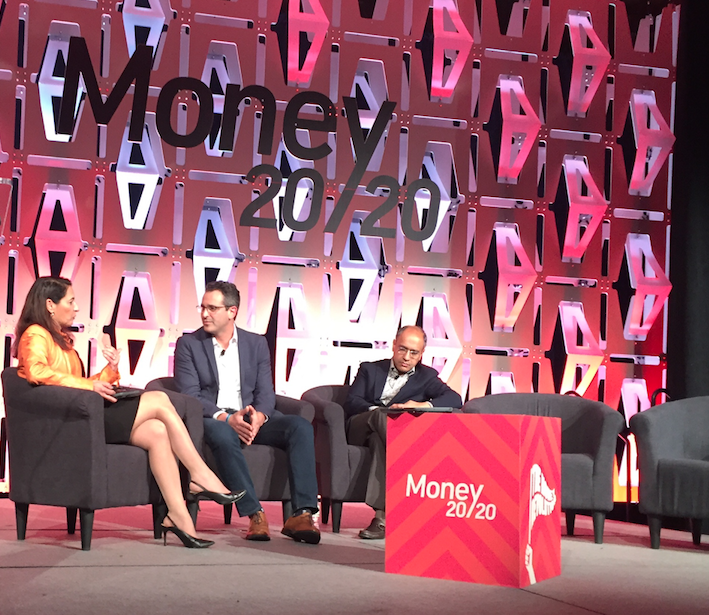 In the wake of OnDeck’s announcement of ODX, a new subsidiary that will service banks, OnDeck CEO and Money 20/20 veteran Noah Breslow took to the stage for a discussion with his new business partner, Lakhbir Lamba, Head of Retail Lending at PNC Bank. PNC will now be using ODX to originate lines of credit for the bank’s small business customers, while everything will stay on PNC’s balance sheet.
In the wake of OnDeck’s announcement of ODX, a new subsidiary that will service banks, OnDeck CEO and Money 20/20 veteran Noah Breslow took to the stage for a discussion with his new business partner, Lakhbir Lamba, Head of Retail Lending at PNC Bank. PNC will now be using ODX to originate lines of credit for the bank’s small business customers, while everything will stay on PNC’s balance sheet.
“We’re keeping a laser focus on small business lending,” Breslow said, when asked if OnDeck would begin to serve other segments of the market, like student or auto loans.
“The problems that small businesses face are worldwide,” Breslow said, indicating that the company has interest in expanding service to small businesses internationally. Already, OnDeck operates in Canada and Australia.
The moderator asked if an application that is rejected by PNC would become a lead for OnDeck. Breslow and Lamba said that is not currently the arrangement, but that it may be a possibility.
“Our goal [with ODX] is to service banks,” Breslow said, while acknowledging that banks serve a different kind of small business customer than OnDeck.
“We will make sure that we underwrite based on PNC’s risk appetite,” Breslow said.
PayPal is Changing Its Ways, Embracing Main Street
October 23, 2018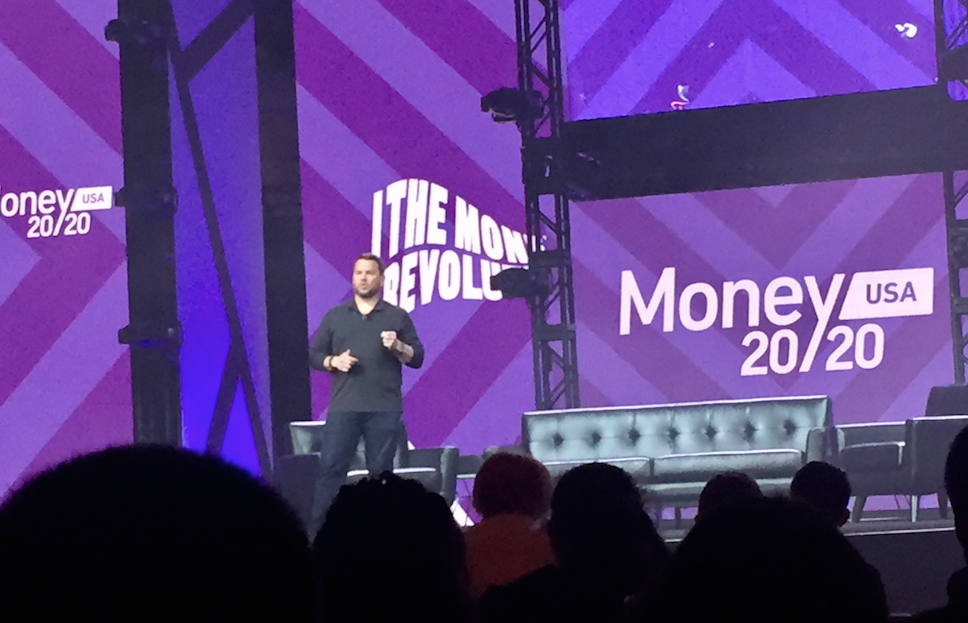 PayPal Chief Operating Officer Bill Ready shared his childhood experience of working for his parents’ auto repair shop to convey his understanding of the challenges that face small businesses.
PayPal Chief Operating Officer Bill Ready shared his childhood experience of working for his parents’ auto repair shop to convey his understanding of the challenges that face small businesses.
“Tech has gotten faster, but money has gotten slower,” he said, referring to how small businesses, like his parents’, used to receive most of its money right away in cash. “Now, money is tied up in the digital world and it can take days, even weeks [to collect.]”
Ready said that, through PayPal, small business owners can get their money immediately. He also said that some small business owners can get loans from PayPal almost instantly. He gave the example of a business owner in Arizona with a staff of 12 who couldn’t get a loan from a bank because his company didn’t have assets. But the company did have a payment history with PayPal which qualified it for a small business loan that Ready said hit the owner’s account in 30 seconds.
Not all of Ready’s presentation touted the company’s capabilities. Part of his talk had an apologetic tone.
“Paypal was hesitant about partnerships, but not anymore,” he said, acknowledging that helping “Mainstreet” will require the collaboration of fintech companies and changing attitudes about customers.
“You might have heard people say ‘Who owns the customer?’ We’ve been guilty of that,” he said.
But Ready said that PayPal has changed its perspective and that they want to make it easy for other fintech companies to partner with them.
Petralia Says to Focus on Millennials
October 23, 2018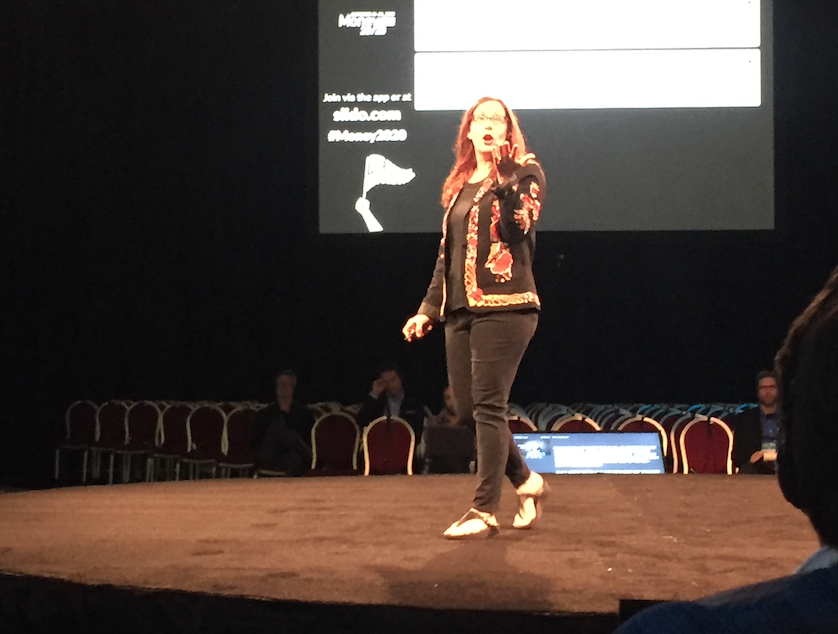 Kabbage CEO and Co-founder Kathryn Petralia gave a fast-paced presentation at Money 20/20 yesterday that touched on gun violence, marijuana and gender identity, all in 20 minutes.
Kabbage CEO and Co-founder Kathryn Petralia gave a fast-paced presentation at Money 20/20 yesterday that touched on gun violence, marijuana and gender identity, all in 20 minutes.
The loose connecting thread was millennials, which Petralia’s powerpoint identified as people born between 1981 and 2002. There are 90 million millennial Americans and they have outnumbered babyboomers since 2017, Petralia asserted. So we have to pay attention to them and cater to their needs, she conveyed.
“Millennials are not as short on money as they are on time,” Petralia said, and she expressed that using data to improve speed and efficiency is therefore critical.
“The millennials are coming” read one of the powerpoint slides. But Petralia said they already have.
Branson Adds Charm, Not Expertise, to Money 20/20
October 23, 2018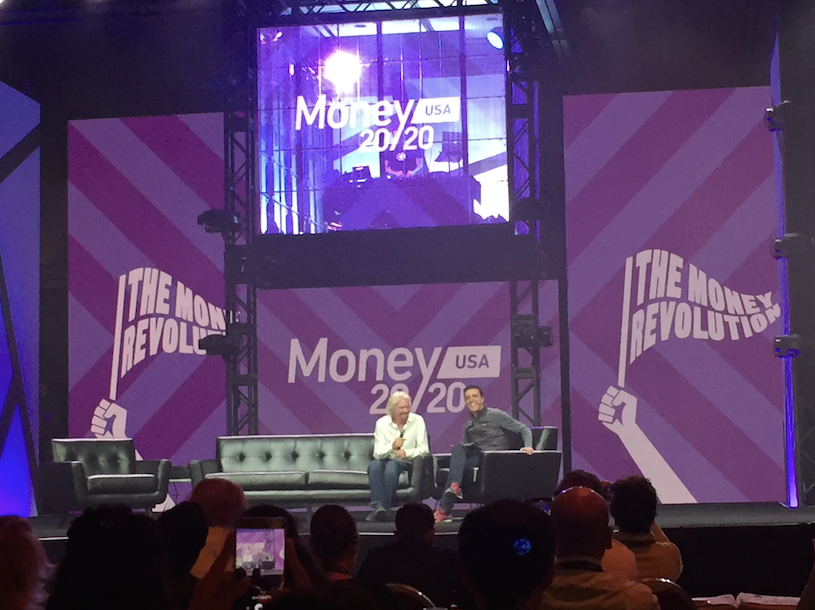 Money 20/20’s keynote speaker, serial entrepreneur and philanthropist Sir Richard Branson, delivered inspiration and laughs to a packed audience yesterday. He was interviewed by Nuno Sebastiao, CEO of Feedzai, which fights financial crime.
Money 20/20’s keynote speaker, serial entrepreneur and philanthropist Sir Richard Branson, delivered inspiration and laughs to a packed audience yesterday. He was interviewed by Nuno Sebastiao, CEO of Feedzai, which fights financial crime.
While over 20 years ago Branson founded Virgin Money, a sizable UK-based bank, he demonstrated clear discomfort and disinterest in talking about banking. When asked about finance, he said, “I brought notes,” and produced what looked like a thick chunk of papers from his pocket. When Sebastiao said, “moving out of the financial space,” Branson said “thank you!” which elicited a wave of laughter.
“I’ve seen situations in life that have frustrated me,” Branson said, and explained that Virgin Money is the result of a contract he was about to sign with a money management firm. He said that when he asked the investment firm what “bid offered 5%” meant, they got quiet. He then learned that it meant that they would take five percent of the amount he gave them before investing anything. Upset by that, he thought he could do better in financial services and he hired a banker to help launch the company.
Similarly, he said Virgin Airlines was born when he couldn’t get a flight from Puerto Rico to the Virgin Islands because the airline said there weren’t enough passengers that day. He thought he could do better.
Since he first saw a man walk on the moon, he said he always imagined that he and his family would go to the moon someday. But when he realized about 14 years ago that it didn’t look like that was going to happen, he created Virgin Galactic Airways, which is the first commercial rocket program to the moon.
“I registered Virgin Galactic Airways and Virgin Intergalactic Airways, because I’m quite an optimist,” Branson said, producing another wave of laughter.
After years of testing, in which one test pilot was killed, Branson said that he plans to go to the moon next year.
“We can’t leave it up to government to solve the world’s problems,” Branson said, conveying that businesses, small and large, must play a role in improving the world, whether it be on a local or international level.
At the close of the interview, to bring the topic back to finance, Branson said, “Hopefully I’ll learn a little more about banking for next time.”






























